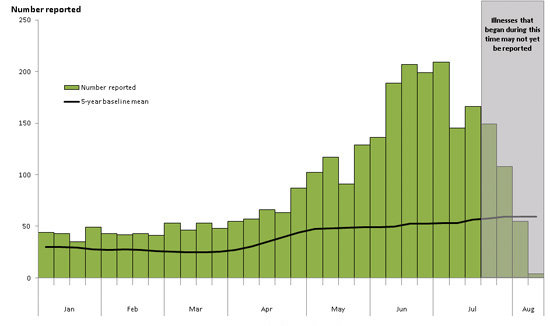Effects of S. 510 on small farms: Senate staff analysis
Thanks to reader Michael Bulger for forwarding the Senate staff analysis of the impact of S. 510 on small farms. Here’s what it says (slightly edited):
No Change in Agency for Regulated Foods: Only foods already regulated by the Food and Drug Administration (FDA) will be subject to S. 510. Section 403 maintains the existing firewall between FDA and the U.S. Department of Agriculture regulated foods and agricultural products.
No Change in Definition of Facility: Under the Bioterrorism Act of 2002, certain food businesses were considered “facilities” and had to register with FDA. Farms and restaurants were exempted. This definition is not changed in S. 510. If an entity does not need to register now, it will not need to register under S. 510.
Flexibility for Small Businesses: Small businesses are given regulatory flexibility throughout S. 510. For example, small processors are given additional time to comply with new food safety practices and guidelines created by the bill and the Secretary may modify or exempt small processors from new hazard analysis and preventive control requirements based on size and risk. The legislation also requires the FDA to publish several user-friendly small entity compliance guides to assist firms with the implementation of new practices.
Scale Appropriate Produce Safety Standards: In coordination with the Secretary of Agriculture, FDA develops science-based standards for the safe production and harvesting of fruits and vegetables. Priority is given to specific fruits and vegetables that have the highest risk of food borne illness outbreaks. Flexibility is given for different growing, production, and harvesting techniques. FDA has the discretion to limit produce safety standards for small and very small entities that produce or harvest food which pose little or no serious risk to human health. Consideration is also given to conservation and environmental standards already established by federal natural resource and wildlife agencies. Exemptions are also available for low risk commodities. FDA must minimize the burden of paperwork and, as appropriate, the number of separate standards for separate foods.
Increased Training Opportunities: The bill requires FDA to coordinate with the extension activities of the National Institute of Food and Agriculture (NIFA) of the U.S. Department of Agriculture in educating growers and small processors about any new practices required by S. 510. Necessary funds are authorized to conduct these extension activities. The bill also provides for the training and education of state, local, and tribal authorities to facilitate the implementation of new standards under the FDA Food Safety Modernization Act. Competitive grants are made available, for up to 3 years, to support these efforts to enhance education, training, and technical assistance.
Risk-Based Traceability: The ability to trace back potentially unsafe food in the event of a food-borne illness outbreak is important. For the purpose of traceability, farms and small businesses that are not food facilities are not expected to create new records. During an active investigation of a foodborne illness outbreak, in consultation with state and local officials, the Secretary may ask a farm to identify potential immediate recipients of food if it is necessary to protect public health or mitigate a foodborne illness outbreak. Limitations are also included for restaurants, commingled agricultural commodities, direct to consumer sales, fishing vessels and products carrying an identity preserved label.
Regulatory Flexibility for Organic Foods: Throughout the bill, consideration is given to the unique agricultural practices and requirements of organic foods under the Organic Foods Production Act of 1990.
Protections for Farmers Markets, Cottage Industries and Direct Farm-to-Market Sales: Small entities that produce food for their own consumption or market the majority of their food directly to consumers or restaurants are not subject to registration or new recordkeeping requirements under S. 510. This includes food sold through farmers’ markets, bake sales, public events and organizational fundraisers.
I hope this helps to calm things down a bit. This bill needs all the support it can get. It’s not perfect but it is a reasonable first step, and badly needed.


